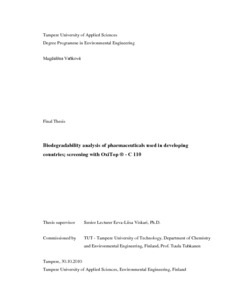Biodegradability analysis of pharmaceuticals used in developing countries; screening with OxiTop C-110
Vanková, Magdaléna (2010)
Vanková, Magdaléna
Tampereen ammattikorkeakoulu
2010
All rights reserved
Julkaisun pysyvä osoite on
https://urn.fi/URN:NBN:fi:amk-2010120817546
https://urn.fi/URN:NBN:fi:amk-2010120817546
Tiivistelmä
ABSTRACT
Recently, a significant number of studies regarding the environmental occurrence and fate of pharmaceuticals and personal care products (PPCPs) used in developed countries has been published. In the developing world, different therapeutic groups are frequently used without the knowledge of their behavior in the aquatic and terrestrial ecosystems. Great number of pharmaceuticals detected from the natural ecosystems around the world and the reported impact on non-target organisms suggest that PPCPs are potent and persistent environmental pollutants.
The herein presented study, conducted with the support of pharmaceutical company in Nairobi; Kenya, analyzed the biodegradation potential of seventeen selected pharmaceuticals typical for the developing world. The test method was based on the Organization for Economic Co-operation and Development (OECD) 301 guidelines and OxiTop®-C 110 system was employed in the measurement. The principle of the measurement was manometric respirometry in a closed bottle system measuring the microbial activity by carbon dioxide evolution. Dextrose monohydrate and carbamazepine were selected to test the functionality of the system and to connect to the literature data.
Only two drugs from seventeen were readily biodegradable. All tested antiviral drugs, antimalarials, antiparasitics, antifungals, antituberculotics, antibacterials, and antiulceratives were found non-degradable, potentially persistent in the environment or affecting the efficiency of wastewater treatment plant (WWTP) processes.
Recently, a significant number of studies regarding the environmental occurrence and fate of pharmaceuticals and personal care products (PPCPs) used in developed countries has been published. In the developing world, different therapeutic groups are frequently used without the knowledge of their behavior in the aquatic and terrestrial ecosystems. Great number of pharmaceuticals detected from the natural ecosystems around the world and the reported impact on non-target organisms suggest that PPCPs are potent and persistent environmental pollutants.
The herein presented study, conducted with the support of pharmaceutical company in Nairobi; Kenya, analyzed the biodegradation potential of seventeen selected pharmaceuticals typical for the developing world. The test method was based on the Organization for Economic Co-operation and Development (OECD) 301 guidelines and OxiTop®-C 110 system was employed in the measurement. The principle of the measurement was manometric respirometry in a closed bottle system measuring the microbial activity by carbon dioxide evolution. Dextrose monohydrate and carbamazepine were selected to test the functionality of the system and to connect to the literature data.
Only two drugs from seventeen were readily biodegradable. All tested antiviral drugs, antimalarials, antiparasitics, antifungals, antituberculotics, antibacterials, and antiulceratives were found non-degradable, potentially persistent in the environment or affecting the efficiency of wastewater treatment plant (WWTP) processes.
